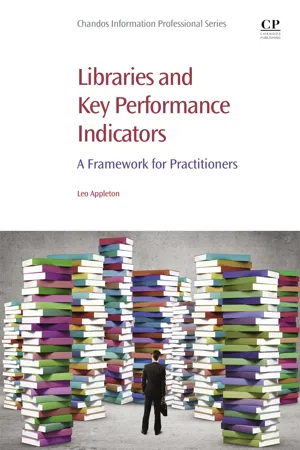
- 164 pages
- English
- ePUB (mobile friendly)
- Available on iOS & Android
About this book
Libraries and Key Performance Indicators: A Framework for Practitioners explores ways by which libraries across all sectors can demonstrate their value and impact to stakeholders through quality assurance and performance measurement platforms, including library assessment, evaluation methodologies, surveys, and annual reporting. Whilst several different performance measurement tools are considered, the book's main focus is on one tool in particular: Key Performance Indicators (KPIs). KPIs are increasingly being used to measure the performance of library and information services, however, linking KPIs to quality outcomes, such as impact and value can prove very difficult. This book discusses, in detail, the concept of KPIs in the broader context of library assessment and performance measurement. Through reviewing some of the applied theory around using KPIs, along with harvesting examples of current best practices in KPI usage from a variety of different libraries, the book demystifies library KPIs, providing a toolkit for any library to be used in setting meaningful KPIs against targets, charters, service standards, and quality outcomes.- Provides an overview of performance measurement tools for libraries- Discusses KPIs in a broad context- Offers an understanding of reporting, monitoring, and acting upon KPI data- Provides best practice examples of Key Performance Indicators (KPIs) in libraries- Includes practical and reusable examples of KPIs that can be applied in local contexts (a toolkit approach)
Tools to learn more effectively

Saving Books

Keyword Search

Annotating Text

Listen to it instead
Information
Table of contents
- Cover image
- Title page
- Table of Contents
- Copyright
- About the Author
- Chapter One: Introduction
- Chapter Two: What Do KPIs Have to Do With Libraries?
- Chapter Three: A Brief History of Evaluation and Performance Measurement in Libraries
- Chapter Four: Developing a Culture of Performance Measurement
- Chapter Five: Performance Measurement in the Digital Age
- Chapter Six: Quantitative Methods of Performance Measurement
- Chapter Seven: Qualitative Methods for Performance Measurement
- Chapter Eight: Mixed Methods for Performance Measurement
- Chapter Nine: An Overview of Key Performance Indicators
- Chapter Ten: How Can KPIs Be Used in Performance Measurement?
- Chapter Eleven: Case Studies
- Chapter Twelve: Using KPIs in Your Library and Information Service
- Chapter Thirteen: Final Reflections Performance Measurement and Performance Indicators
- References
- Appendix A: Kingston University, Key Performance Indicators and Service Standards
- Appendix B: NHS, Template to support the creation and sharing of quality metrics: GMC Survey Scores
- Appendix C: NHS, Template to support the creation and sharing of quality metrics: LQAF Compliance
- Appendix D: NHS, Template to support the creation and sharing of quality metrics: OpenAthens
- Appendix E: British Library, Example of Strategic Performance Dashboard, 2016/17 From The British Library
- Appendix F: Edge Hill University, Learning Services: Key Performance Indicators
- Appendix G: McMaster University Library Scorecard
- Index
Frequently asked questions
- Essential is ideal for learners and professionals who enjoy exploring a wide range of subjects. Access the Essential Library with 800,000+ trusted titles and best-sellers across business, personal growth, and the humanities. Includes unlimited reading time and Standard Read Aloud voice.
- Complete: Perfect for advanced learners and researchers needing full, unrestricted access. Unlock 1.4M+ books across hundreds of subjects, including academic and specialized titles. The Complete Plan also includes advanced features like Premium Read Aloud and Research Assistant.
Please note we cannot support devices running on iOS 13 and Android 7 or earlier. Learn more about using the app